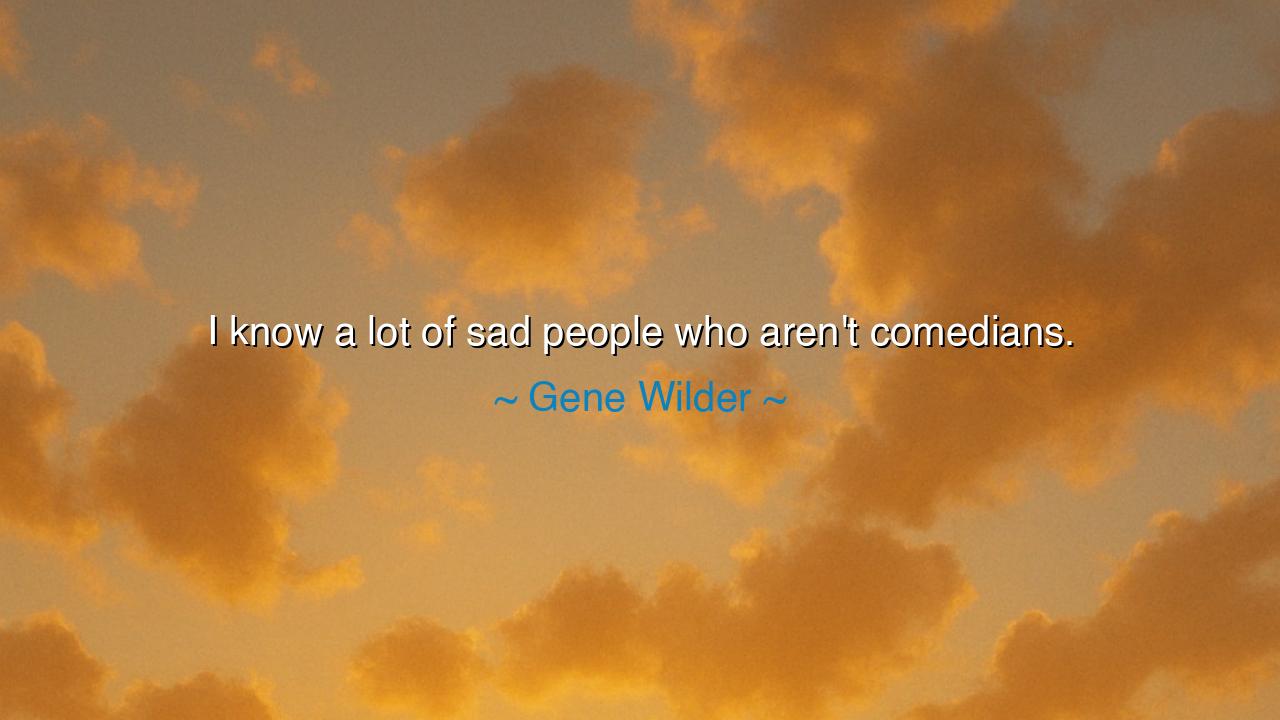
I know a lot of sad people who aren't comedians.






Hear now, O seekers of understanding, the words of Gene Wilder, a man whose laughter was laced with depth, whose humor was not born of ignorance, but of insight. “I know a lot of sad people who aren't comedians.” In this simple truth lies a profound reflection on the nature of human sorrow and art, and the false belief that those who create laughter must themselves be broken by sadness. Wilder, who lived and performed with tenderness and melancholy intertwined, reminds us that sadness is not the property of a profession or a persona, but a thread that runs through the fabric of all human lives.
The world often imagines the comedian as a tragic figure—the clown who hides behind the painted smile, the jester who jokes to avoid his own pain. Wilder’s words push back against this myth. He does not deny that sadness touches those who make others laugh, but he reminds us that sorrow is universal, that it is not reserved for the artist or performer, but shared by all. In doing so, he restores dignity to both the comedian and the ordinary soul, declaring that the weight of emotion is a mark of humanity, not of occupation.
To grasp the depth of this wisdom, recall the life of Charlie Chaplin, that silent master of laughter whose films danced between joy and despair. In City Lights and Modern Times, he used humor not to escape sorrow, but to reveal it—to show that laughter and grief are siblings born of the same heart. Yet even Chaplin’s sorrow did not make him unique; it made him human. Like Wilder, he understood that the capacity to feel deeply—whether in tears or in laughter—is the essence of being alive.
Wilder’s quote also speaks to the danger of simplification, of labeling people by their emotions or their roles. We live in a world eager to categorize: the happy and the sad, the strong and the weak, the comedian and the sufferer. But life resists such boundaries. A person who creates laughter may weep in solitude, while another who appears somber may carry quiet joy within. Human emotion is not a mask to be worn but a landscape to be explored, and Wilder’s wisdom calls us to look upon others—and ourselves—with gentler, wiser eyes.
His words were also born from personal experience. Wilder himself lived through love and loss—his marriage to Gilda Radner, whose death from cancer in 1989 shattered him, taught him the fragility of happiness. Yet even amid grief, he continued to speak of hope, of humor, and of the beauty of living truthfully. His statement, then, is not one of cynicism, but of acceptance—the recognition that life’s beauty is not diminished by sorrow, but made more profound by it.
From this reflection comes a lesson as timeless as it is simple: do not envy another’s laughter nor pity another’s tears, for both arise from the same sacred source. The presence of sadness does not signify failure, nor does the ability to make others smile mean one is free from pain. To be human is to hold both light and shadow, to let each inform and balance the other. Wilder’s insight reminds us that sorrow does not disqualify joy—it deepens it.
Practical wisdom flows from his words. When you encounter laughter, honor the courage it takes to create it. When you meet sadness, offer understanding, not judgment. And in yourself, do not fear emotion—whether it be joy, grief, anger, or peace. Each feeling is a messenger, guiding you toward compassion, awareness, and strength.
Thus, let the words of Gene Wilder echo across time: sadness belongs to no one person, no one role, no one mask. It is a river that flows through all hearts, cleansing, humbling, and connecting us. To recognize this is to see humanity clearly—to know that the comedian and the mourner, the joyful and the grieving, are not opposites, but one and the same: seekers of meaning in the vast, mysterious landscape of the human soul.






AAdministratorAdministrator
Welcome, honored guests. Please leave a comment, we will respond soon